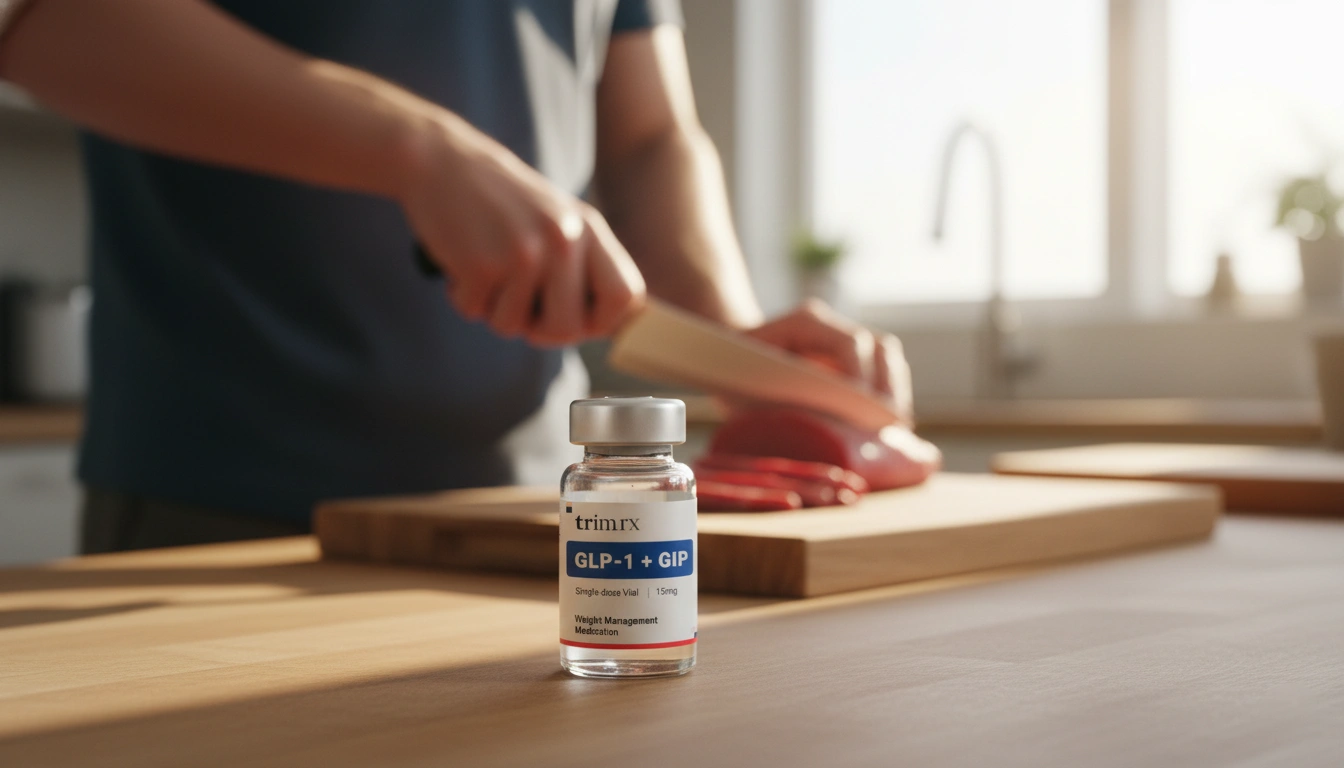Can GLP-1 Make You Tired? Understanding the Connection

Introduction
Did you know that nearly half of American adults are currently trying to lose weight? With so many individuals seeking effective solutions, GLP-1 receptor agonists have emerged as a popular option, promising not only weight loss but also improved metabolic health. However, as with any medication, side effects are an essential aspect to consider. Among these, fatigue has been reported by some users, leading to questions about its implications and management.
In this post, we will provide a comprehensive overview of GLP-1 medications, their mechanism of action, and the potential side effects, including tiredness. We’ll discuss how these medications influence energy levels, and we’ll offer practical tips for managing fatigue if it occurs. By the end, you will have a better understanding of the nuances of GLP-1 medications and how to navigate your weight loss journey with confidence.
Our exploration will include:
- The science behind GLP-1 medications and how they work
- Common side effects associated with GLP-1 medications, including fatigue
- Possible reasons for tiredness experienced by users
- Strategies to mitigate fatigue while on GLP-1 medications
- The importance of personalized care and support in your weight loss journey
Let’s dive into the fascinating world of GLP-1s and uncover how they might impact your energy levels.
When embarking on a weight loss journey, many of us are eager to discover effective solutions that can help us achieve our goals. As we explore various options, it’s crucial to consider not only the benefits but also the potential side effects of medications that are designed to assist in weight loss, such as GLP-1 receptor agonists. One common concern that arises is: Can GLP-1 make you tired?
With the increasing popularity of GLP-1 medications—originally developed to manage type 2 diabetes and now widely used for weight management—understanding their effects on our bodies is more important than ever. In this blog post, we will delve into the relationship between GLP-1 medications and fatigue, helping you decipher what to expect when you start a GLP-1 regimen. Together, we’ll explore the science behind these medications, the reasons for potential tiredness, and how to manage this side effect effectively.
Understanding GLP-1 Medications
What Are GLP-1 Receptor Agonists?
GLP-1, or glucagon-like peptide-1, is a hormone produced in the intestines that plays a crucial role in regulating blood sugar levels, appetite, and energy balance. GLP-1 receptor agonists are synthetic versions of this hormone that mimic its effects. These medications help lower blood sugar levels and promote weight loss by enhancing insulin secretion, inhibiting glucagon release (which increases blood sugar), and slowing gastric emptying.
Some of the most commonly used GLP-1 medications include:
- Semaglutide (Ozempic®, Wegovy®)
- Tirzepatide (Mounjaro®, Zepbound®)
These medications have shown significant efficacy in promoting weight loss, often leading to reduced appetite and caloric intake. For many, they represent a promising tool in the fight against obesity.
How Do GLP-1 Medications Work?
GLP-1 medications work through several mechanisms:
- Appetite Regulation: By acting on the brain’s appetite control centers, GLP-1 medications help reduce hunger and increase feelings of fullness.
- Glycemic Control: They enhance insulin secretion in response to meals and suppress glucagon release, improving blood sugar control.
- Slowed Gastric Emptying: By slowing down the digestive process, these medications help prolong the sensation of fullness after eating.
While these effects can lead to significant weight loss and improved metabolic health, they may also come with side effects, including gastrointestinal issues and fatigue.
The Role of GLP-1 in Weight Loss
Studies have demonstrated that GLP-1 medications can lead to substantial weight loss, comparable to the results achieved through bariatric surgery in some cases. For instance, participants in clinical trials of semaglutide have experienced weight reductions of over 15% of their body weight within a year. This rapid weight loss can trigger several physiological changes in the body, which may explain some of the side effects users experience, including fatigue.
Common Side Effects of GLP-1 Medications
While GLP-1 medications can be effective for weight loss, they are not without their drawbacks. Here, we’ll examine some common side effects associated with these medications:
1. Gastrointestinal Issues
Many users report gastrointestinal side effects such as nausea, vomiting, diarrhea, and constipation when starting GLP-1 medications. These symptoms are often temporary but can be quite uncomfortable.
2. Fatigue
Fatigue is a side effect that some users report, particularly during the initial stages of treatment. This can be frustrating, especially for individuals who are hoping to boost their energy levels through weight loss.
3. Changes in Appetite
While GLP-1 medications are designed to suppress appetite, some users may experience fluctuations in hunger levels as their bodies adjust to the treatment.
4. Injection Site Reactions
Some individuals may experience redness, itching, or swelling at the injection site, although these reactions typically resolve quickly.
5. Headaches and Dizziness
Changes in blood sugar levels can lead to headaches and dizziness in some users, particularly during the first few weeks of treatment.
Understanding these potential side effects can help prepare individuals for their experience on GLP-1 medications and foster open discussions with healthcare providers about managing these issues.
Can GLP-1 Make You Tired?
Exploring the Connection Between GLP-1 and Fatigue
Fatigue experienced by GLP-1 users can be attributed to several factors:
- Rapid Weight Loss: As mentioned earlier, GLP-1 medications can lead to significant weight loss within a short period. This rapid change can cause the body to adapt in ways that may temporarily affect energy levels. For example, when the body loses weight quickly, it may trigger physiological responses that can lead to feelings of tiredness or lethargy.
- Caloric Deficit: As appetite decreases, many individuals may unintentionally consume fewer calories than their bodies need. This caloric deficit can lead to fatigue, especially if nutrient intake is not optimized. Ensuring adequate nutrition is essential for maintaining energy levels during weight loss.
- Changes in Metabolism: The body’s metabolism adapts to weight loss, which can alter energy levels. As the body works to stabilize its new weight, individuals may find themselves feeling more fatigued than usual.
- Sleep Disruption: Some users report sleep disturbances as their bodies adjust to the medication. This can include insomnia or changes in sleep quality, both of which can contribute to feelings of fatigue.
The Individual Experience
It’s important to note that not everyone will experience fatigue when taking GLP-1 medications. Factors such as body composition, activity levels, and overall health can influence how individuals respond to these drugs. For some, fatigue may be mild and temporary, while others may need support to manage it effectively.
Strategies for Managing Fatigue on GLP-1 Medications
1. Prioritize Nutrition
Eating a balanced diet with adequate protein, healthy fats, and whole grains is essential for energy. Consider incorporating nutrient-dense foods that provide sustained energy levels throughout the day, such as:
- Lean proteins (chicken, fish, legumes)
- Whole grains (quinoa, brown rice, oats)
- Fruits and vegetables rich in vitamins and minerals
2. Stay Hydrated
Dehydration can contribute to fatigue. Aim to drink plenty of water throughout the day to ensure proper hydration. Electrolyte-rich drinks may also be beneficial, especially if you experience gastrointestinal side effects.
3. Monitor Your Energy Levels
Pay attention to how your body feels. If you notice a decline in energy, consider adjusting your meal schedule. Eating smaller, more frequent meals can help stabilize blood sugar levels and provide consistent energy.
4. Incorporate Light Physical Activity
Gentle exercise, such as walking or stretching, can improve circulation and boost energy levels. Even short bursts of activity can make a difference in combating fatigue.
5. Consult with Your Healthcare Provider
If fatigue persists or significantly impacts your daily life, it’s essential to discuss this with your healthcare provider. They can assess your symptoms and, if necessary, adjust your medication dosage or explore alternative options.
The Importance of Personalized Care
At TrimRx, we emphasize the value of personalized care in our weight loss programs. Our approach combines cutting-edge telehealth innovations with effective, medically supervised weight loss solutions tailored to each individual’s unique journey.
When considering GLP-1 medications, we encourage you to take our free assessment quiz to determine your eligibility. This personalized approach allows us to create a treatment plan that supports your weight loss goals while addressing any potential side effects, including fatigue.
In addition to our prescription medications, we offer quick-access supplements, such as our GLP-1 Daily Support and Weight Loss Boost, designed to support your overall wellness during your journey.
Conclusion
Understanding the potential side effects of GLP-1 medications—including fatigue—is essential for anyone considering these treatments. By recognizing the connection between GLP-1 and tiredness, you can take proactive steps to manage your energy levels and maintain a positive outlook on your weight loss journey.
Remember, while fatigue can be a concern for some users, many experience significant benefits from GLP-1 medications, including improved metabolic health and sustainable weight loss. By prioritizing nutrition, staying hydrated, and maintaining open communication with your healthcare provider, you can navigate your treatment effectively.
As we continue to explore the landscape of weight loss solutions, we’re committed to providing you with the support you need. If you’re ready to embark on your journey towards a healthier lifestyle, don’t hesitate to take our free assessment quiz today to see if you qualify for our personalized weight loss medications.
FAQ
What should I do if I feel fatigued while taking GLP-1 medications?
A: If you experience fatigue, prioritize proper nutrition, stay hydrated, and incorporate light physical activity. If fatigue persists, consult your healthcare provider for personalized advice.
How long does fatigue last when starting GLP-1 medications?
A: Fatigue may be more pronounced during the initial stages of treatment and often diminishes as your body adapts. Individual experiences may vary.
Can I continue my regular exercise routine while on GLP-1 medications?
A: Yes, incorporating gentle exercise into your routine can help combat fatigue and improve energy levels. Listen to your body and adjust your activity level as needed.
Are there any dietary changes I should consider while taking GLP-1 medications?
A: Focus on a nutrient-dense diet that includes lean proteins, whole grains, fruits, and vegetables. Small, frequent meals can help stabilize energy levels.
How can TrimRx support me in my weight loss journey?
A: At TrimRx, we offer personalized weight loss programs, including GLP-1 medications and quick-access supplements, designed to support your unique journey towards health and wellness.

Transforming Lives, One Step at a Time
Keep reading
China’s Supreme Court Upholds Semaglutide Patent for Novo Nordisk
China’s Supreme People’s Court upholds Novo Nordisk’s semaglutide compound patent, supporting IP protection.
Over 600,000 Californians Risk Losing Access to GLP-1 Weight-Loss Drugs
California’s Medi-Cal will stop covering GLP-1 weight-loss drugs for weight-loss-only prescriptions, effective Jan. 1, 2026.
Weight-Loss Pill Approval Likely to Prompt Overhaul of Packaged Food and Fast-Food Products
FDA approval of GLP-1 weight-loss pills may prompt food makers and restaurants to shift to high-protein, smaller-portion products.



